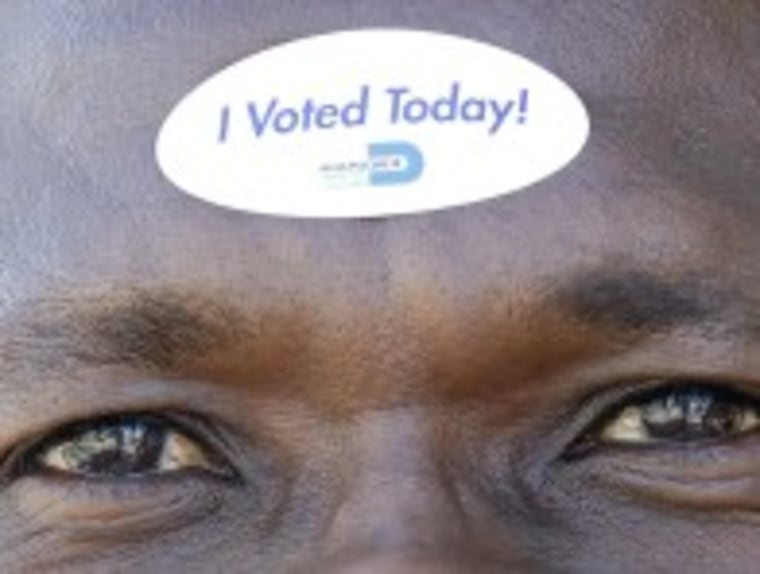On November 8, 2012 I wrote this column about President Obama's legacy after securing a second term. It seems I grossly underestimated myself, especially in light of this week's oral arguments in Shelby County v. Holder.
Shelby is the latest case the court will use to determine the viability of the landmark Voting Rights Act of 1965. The VRA was signed into law by President Lyndon Johnson after the nation saw the ugliness of the Southern states during one of our nation's worst periods of social unrest. The law erased discriminatory barriers to voting, specifically for black Americans, and forced many Southern states to pre-clear any changes to the way they administered elections and the ability to vote. Since 1975, the Congress has expanded the reach of the VRA to other minority groups, including Hispanic Americans. In 2006, the Senate unanimously voted to reauthorize the VRA and the House voted overwhelmingly the same. In recent years, various conservative Justices have questioned the constitutionality of the VRA but have never gone so far as to strike the law of the land down in part or in whole.
The life of the Voting Rights Act may be short, for all of that changed this past week when the far-right's favorite Justice, Antonin Scalia, uttered something remarkable from the bench when he called the Voting Rights Act "a phenomenon that is called perpetuation of racial entitlement." Yep, he went there. He went there in a very Glenn Beck, Rush Limbaugh kind of way. He went where no Justice in my lifetime has gone. He went where I expect political conservatives to play, to the sandbox of the Rand Pauls and Steve Kings of our political world. He went where I've never heard a Supreme Court Justice blatantly go: into the politics of race.
I am a son of the South, grew up in South Carolina, a state where my family has lived since the 17th century. I'm proud of "my people" but I'm not proud of our past or current racism whether it be overt or blatant. I was graduated from the Citadel, a military college in Charleston, SC, in 1989, the same college that was founded to "put down" a slave rebellion in 1842 and the same college that fired the first shots of our nation's Civil War in January 1861. I firmly believe my home state has come a long way from 1861, from 1961 but even today, the Confederate flag flies prominently in front of the state capitol in Columbia. Racism, my friends, isn't gone. There's simply less of it but the immoral cancer still lives in the body of our nation.
Justice Scalia's comments from the bench of "racial entitlement" were code to white Americans. Let's be clear: he sent a strong message to the entire nation that the Voting Rights Act isn't constitutional because it gave black America an entitlement that's found no where in his view of our Constitution. This interpretation of our Constitution should scare every American regardless of political party.
The court has had a long history of oxygen masks, walking canes, and hearing aids. Justice William O. Douglas served on the court for nearly 37 years, retiring in 1975 after suffering a debilitating stroke nearly a year prior which left him both wheelchair bound and mostly incapable of participating in the Court's proceedings. It wasn't until his close friend, former Justice Abe Fortas, stepped in that he retired and even then he tried to remain active within the court, much to his former colleagues' collective chagrin. There are myriad other examples of this but you get the point: these Justices will stick around, even after disease and mortality have rendered their minds and bodies weak. Justice Scalia might be 76 years old, but he's is one tough bird.
To date, President Obama has appointed two to the high court: Justice Sonia Sotomayor and Justice Elena Kagan. The court currently has four Justices over the age of 70: Justice Scalia is 76, Justice Kennedy is also 76, Justice Breyer is 74, and Justice Ginsburg is 79. The latter has indicated she won't step down until she matches former Justice Brandeis' tenure, putting her retirement in 2015. A little known fact: the last 10 justices to retire had an average age of 80. So yeah, the above are all knock-knock-knockin' on the court's door.
It's possible President Obama could appoint up to four new justices before he leaves office in January 2017. While the court is tilted slightly to the right at this point, a Scalia retirement coupled with a Kennedy retirement could turn the court solidly left, leaving Justices Thomas, Alito, and Roberts as the sole conservatives left. Of all the legislation to be passed in the coming four years, nothing and I repeat nothing is more important than Obama's future appointments to the Supreme Court. Elections matter--they have consequences. In the coming months, the Supreme Court may destroy the Voting Rights Act and with it, a barrier to racial discrimination this country still needs.
And if that happens, his future appointments to the high court will matter to every American: black, white, male, female, gay, straight, Latino, etc. If you don't believe me, just listen to Justice Scalia's words again and again and again: "racial entitlement." This jurist thinks the right to vote is racial entitlement and I've never looked so dimly on the future of our country than I did when he uttered those words in 2013.
